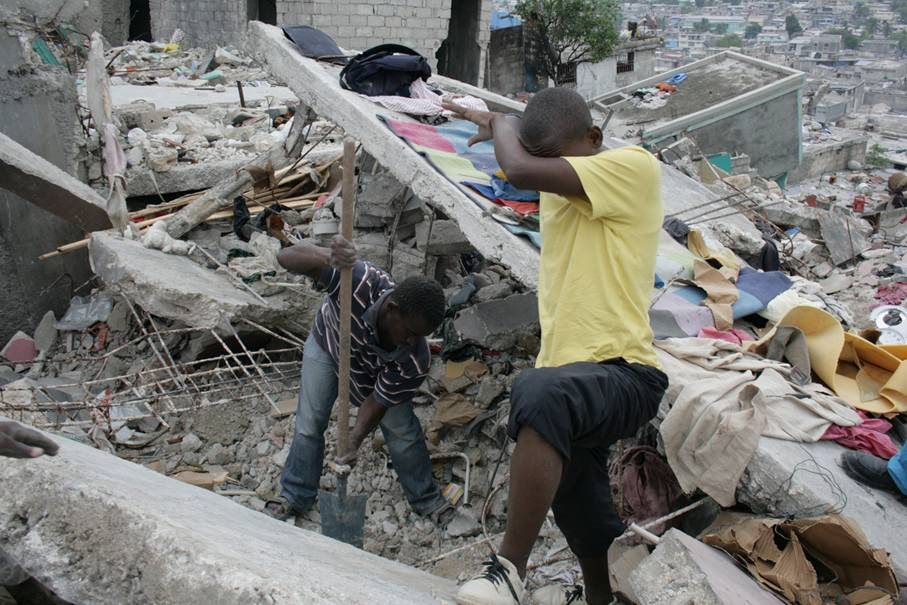Marilyn Allien is president of La Fondation pour Héritage pour Haïti, the Haitian chapter of Transparency International and Roslyn Hees is co-author of Preventing Corruption in Humanitarian Operations, a Transparency International handbook.
The rubble-strewn cityscape of Haiti’s capital gives little reason for hope. The tent city outside our office reeks of sewage and despair. Long lines form for basic food. There is talk of rape and extortion, of food aid vouchers being sold on the black market and worse.
In the midst of this post-earthquake chaos, the international community is on the verge of pledging $11.5 billion to “refound” our nation, to use the words of President René Préval. Given Haiti’s reputation for poor governance, perhaps it is not surprising that the 800 or more local NGOs have been virtually excluded from the reconstruction planning process. We believe this is a mistake and a wasted opportunity.
Haitian NGOs are vital service providers of health, education, food and more, touching all parts of society. They have roots in local communities across the country and are well-placed to help monitor what happens on the ground. They can help ensure that the money is well-spent. Billions have been wasted in the past. This should not be allowed to happen again.
A network of local NGOs who report regularly to donors, the Haitian government and humanitarian aid agencies on what these financial donations have achieved can help add a much-needed layer of accountability to the process. And by taking on this task, Haitian NGOs could even kick-start the kind of radical change that can substantially reduce the endemic corruption that has crippled Haiti for decades. This is not an idealistic claim.
For more than a decade our organization La Fondation pour Héritage Haïti has been dedicated to fighting corruption. Reaching out to Haitians has consistently shown us that people are eager to learn how to fight a system they see as rigged and unfair.
In 2003 we joined Transparency International, the global anti-corruption organization, and in 2008 we formed a coalition of 14 like-minded groups across the country. There is a will in Haiti to unite for a common cause.
In the past, most aid to Haiti has been funnelled either through the central government, known to be fragile well before the earthquake, or directly implemented by international agencies that established parallel services for a country with weak institutions and prone to corruption.
Pre-earthquake Haiti had little transparency and virtually no accountability. We are still waiting, for example, for a full report on how the government spent the millions of dollars donated after the hurricanes in 2008.
Not surprisingly Haiti languishes at the tail end of Transparency International’s Corruption Perceptions Index, scoring just 1.8 out of 10 in 2009.
Today, across Haiti, organizations whose raison d’être is to help people can be instrumental in ensuring the massive influx of aid is not turned into a cocktail of extortion, bribery, kickbacks and abuse of power for private gain.
They can see whether the donated food is sold for profit, who gets the new houses and whether they are up to standard. They will be aware if contracts are given to cronies rather than competent companies. They will know if the rich are privileged over the poor. They can even monitor the work of NGOs. And they can report back.
When so many are watching, there is less room for business-as-usual corruption in government or the private sector. Making public officials accountable to citizens can lead to a sea-change in behavior, even where endemic corruption has persisted for years.
But first Haitian NGOs need to become part of the process.
In Santo Domingo on March 17th, when the donors last convened, Haitian NGOs were not even given the chance to review the post-disaster needs assessment report. Two days later in Port-au-Prince some 100 NGOs met with a mid-level bureaucrat and were asked to sign off on a 35-page technical document outlining the reconstruction plans and processes. This was not genuine consultation.
If we continue to be excluded, it will do Haiti no good. It will only perpetuate the cozy relationship between the powerful and the rich that has frustrated Haiti’s efforts to form a lasting democracy.
Multilateral and bilateral organizations along with the Haitian government should include local NGOs in the planning, implementation and monitoring of the “Refoundation of Haiti”, because it is a sensible thing to do. More importantly, it is in the best interests of the earthquake victims.
We thank the outside world for its support, but Haitians have a legitimate role to play too. After all, when you pack up and go, we and our children will still be here.
Photo credit: © Nancy Palus/IRIN
















 Connect with us on Facebook
Connect with us on Facebook Follow us on Twitter
Follow us on Twitter